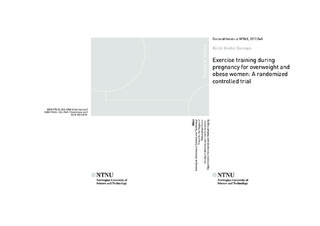Exercise training during pregnancy for overweight and obese women: A randomized controlled trial
Doctoral thesis
Permanent lenke
http://hdl.handle.net/11250/2457209Utgivelsesdato
2017Metadata
Vis full innførselSamlinger
Sammendrag
As the prevalence of obesity is on the rise worldwide, the prevalence of overweight and obese women in childbearing age also increases.1,2 At present, about one third of all women in fertile age are overweight or obese.1,3 This is a major health concern. Maternal overweight or obesity is a risk factor for adverse outcomes during pregnancy, at delivery, and in the postpartum period for both mother and child. The consequences may have a major effect of both short-term and long-term health, and effective preventing strategies are not established. The most frequent adverse maternal health outcomes are increased risk of gestational diabetes mellitus (GDM),4 gestational hypertension, preeclampsia, need for cesarean delivery, and prolonged hospital stay.5-8 Adverse neonatal outcomes are high birth weight,9 birth trauma related to macrosomia, preterm birth, low APGAR-score, insulin resistance,10,11 perinatal death, and transfer to neonatal intensive care unit (NICU).7,12 In addition, pre-pregnancy overweight and obesity are associated with future development of obesity and cardiometabolic diseases for both mother and child.13-15 Compared to normal weight women, overweight and obese women have increased risk of excessive gestational weight gain (GWG),16 and for high postpartum weight retention (PPWR).17,18 Both GWG and PPWR accumulates other already present risks related to pre-pregnancy overweight and obesity.19,20
Results of previous research on lifestyle interventions during pregnancy to prevent adverse outcomes in overweight and obese women diverge.21-26 Several studies assess the combined effect of physical activity and dietary guidance. Healthy pregnant women are recommended to be physically active at least thirty minutes per day on most days of the week.27-29 Physical activity does tend to decrease significantly during pregnancy, especially among women with high body mass index.30 Few randomized controlled trials (RCTs) have investigated the isolated effects of exercise training in pregnancy on gestational weight gain and clinical outcomes in overweight and obese women.23,31,32
The “Exercise Training in Pregnancy for obese women” trail (ETIP) was conducted in the period 2010-2015 at NTNU and St. Olavs Hospital, Trondheim, Norway. The primary aim of the trial was to investigate whether supervised exercise training during pregnancy could reduce gestational weight gain.33 The secondary aim was to assess neonatal birth weight and PPWR. We also examined the effect of regular exercise training during pregnancy on health outcomes as GDM, blood pressure, circulation metabolic markers, neonatal body composition, birth complications, hospital stay, risk of type 2 diabetes mellitus, and the level of physical activity.
We included 91 healthy pregnant women with a body mass index ≥ kg/m2,and they were randomly allocated to an exercise group or a control group. Both groups received standard maternal care. In addition the women in the exercise group were offered supervised training sessions three times per week until delivery. Each exercise session consisted of 35 minutes of moderate walking/running on a treadmill and 25 minutes of strength exercises. All participants underwent assessments at inclusion (gestational week 12-18), late pregnancy (gestational week 34-37), at delivery, and three months postpartum.
The ETIP trail was based on “intention to treat” (ITT), where all available data from the participants was used at all times, independent of whether the participants adhered to the intervention or not. In addition we performed «per protocol analyses» were we compared women in the exercise group who exercised as prescribed, with the women in the control group.
The results of the ETIP trial showed no effect of offering overweight and obese pregnant women supervised exercise training during pregnancy on gestational weight gain,34 neonatal birth weight or PPWR. Women in the exercise group had indeed lower incidence of GDM and lower resting blood pressure in late pregnancy, as well as lower circulating insulin levels postpartum. About 50% of the women in the exercise group adhered to the exercise protocol. We registered no adverse advents due to exercise training in the trial.
Our overall conclusion is that providing a supervised exercise program to overweight and obese pregnant women did not limit gestational weight gain, but reduced the risk of cardiometabolic disorders during pregnancy and in the postpartum period. Based on our findings, we recommend that regular supervised exercise training should be offered as standard maternal care, to overweight and obese women during pregnancy.
Består av
Paper 1: Garnæs, Kirsti Krohn; Mørkved, Siv; Salvesen, Øyvind; Moholdt, Trine Tegdan. Exercise training and weight gain in obese pregnant women: a randomized controlled trial (ETIP Trial). PLoS Medicine 2016 ;Volum 13:1002079.(7) This is an open access article distributed under the terms of the Creative Commons Attribution License Attribution 4.0 International (CC BY 4.0)Paper 2: Garnæs, Kirsti Krohn; Nyrnes, Siri Ann; Salvesen, Kjell Å; Salvesen, Øyvind; Mørkved, Siv; Moholdt, Trine. Effect of supervised exercise training during pregnancy on neonatal and maternal outcomes among overweight and obese women. Secondary analyses of the ETIP trial: A randomised controlled trial. PLoS ONE 2017 ;Volum 12.(3) This is an open access article distributed under the terms of the Creative Commons Attribution License Attribution 4.0 International (CC BY 4.0)
Paper 3: Garnæs, Kirsti Krohn; Mørkved, Siv; Salvesen, Kjell Å; Salvesen, Øyvind; Moholdt, Trine. Exercise training during pregnancy reduces circulating insulin levels in overweight/obese women postpartum: secondary analysis of a randomised controlled trial (the ETIP trial). BMC Pregnancy and Childbirth 2018 - The final published version is avialable at https://doi.org/10.1186/s12884-017-1653-5 © The Author(s). 2018 Open Access This article is distributed under the terms of the Creative Commons Attribution 4.0
